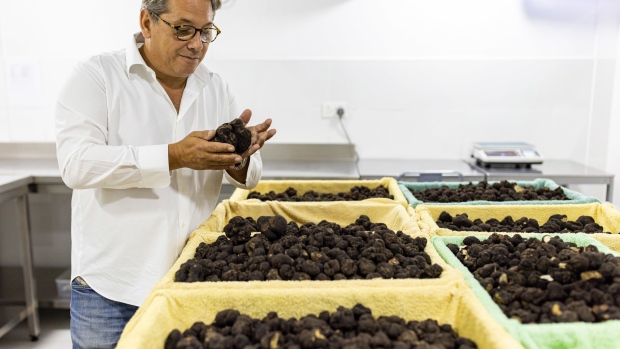Mar 21, 2023
Demand for Truffles in Dubai Is Soaring. Here’s the Man to Call
, Bloomberg News

(Bloomberg) -- One weekend in 2020, chef Francesco Guarracino got a call from one of his regular customers, a very wealthy man flying back to Dubai from London. The diner was looking forward to a favorite dish with truffles that evening at Roberto’s, where Guarracino is group executive chef.
But Guarracino knew he didn’t have enough truffle in the kitchen, so he made a call to one man: Massimo Vidoni.
Vidoni, a 54-year-old Italian native, has become known in Dubai as the “Truffleman,” a name he says a chef coined years ago. The Truffleman excused himself from a family brunch to personally deliver just enough high-quality product to Roberto’s.
“The service Massimo provides is second to none,” Guarracino said. “That’s why he cracked the market.”
Vidoni’s business, Italtouch, has become the go-to supplier of truffles and caviar for a roster of 500 clients across the Gulf region that include Michelin-starred restaurants and winners of the regional 50 Best restaurant awards. The company imported nearly 4,000 kg (8,818 pounds) of truffles in 2022 from countries including Italy, France and Spain.
Demand has never been stronger for truffles in Dubai, where diners expect to be offered dishes adorned with caviar, truffle or even gold leaf—at a premium price, of course. The import value of truffles into the United Arab Emirates neared $4 million for the first time in 2021 and was up 113% from 2021 to 2017, according to United Nations trade data. In that same period, revenue at Italtouch increased 235%, according to figures shared with Bloomberg.
Before Vidoni came to town, chefs in Dubai would get their truffles from general food importers that were more concerned with getting staples like potatoes, rice and meat to clients. They would often have a small selection of truffle products, and quality would vary.
Restaurant owners were often more interested in the place’s vibe than the taste of the food. “Here, they spend $50,000 for a chandelier, no problem,” Vidoni says, but owners will come down on chefs for the cost of ingredients.
Vidoni started his Dubai business by walking into restaurants with a scale and some truffles and insisting the chef have a whiff. He found himself educating clients on the basics: White truffles are only available for a few months in the late fall and early winter; truffles are best served with fatty foods like oil, cream, butter and cheese; they don’t go well with acidic and spicy food, such as tomato, which contrasts and overpowers the flavor.
“Back then, truffles were not very popular,” he said. “When I started introducing truffles to other importers and distributors, they all rejected me and told me they were not interested. Many people told me selling them is not a great idea.”
Vidoni got his start in the truffle-and-caviar import business in New York City in the 1990s, when he worked for Italian truffle importers. He also co-owned a cafe, Terramare, on East 65th Street in Manhattan, and his clients included Nobu, Daniel Boloud, Thomas Keller and Rocco di Spirito. He has pictures with Donald Trump, whose hotels he supplied. In 1997, he made headlines for selling a 1 kg truffle for $3,600.
He moved to Dubai in 2011 when his wife’s company transferred her to the emirate. He decided to try to replicate his New York business in the Middle East.
Vidoni is called upon in tight spots, such as when a wealthy Russian absolutely needed some truffles. The catch? He was on his yacht off the coast in the Persian Gulf. Vidoni sent an employee to deliver the goods. The employee was picked up on a jet ski and brought to the yacht. He delivered the truffles, collected the payment and was returned to shore.
He also was summoned to Abu Dhabi to deliver truffles in August 2020 when a delegation of Israelis visited the UAE as part of the events around the Abraham Accords, which normalized relations between the two countries. Amid tight security, truffles were used in challah brioche.
In one of the larger truffle deliveries of late, Vidoni also supplied the truffles for the smash opening weekend of Atlantis the Royal, which hosted Beyoncé and 1,500 guests for the three-day event. The hotel bought 50 kg of truffles, including 40 kgs of black winter truffles from France and 10 kg of white truffles from Alba—worth more than $100,000.
Vidoni attributes the increase in truffle consumption to both the growth of Dubai as a dining destination, as well as the desire of chefs to add a little bit of luxury to every bite. Truffles are added to the traditional pasta, risotto and pizza, but also used with hummus, sushi, wagyu dishes, and even on top of tuna tartar. For dessert, they’re shaved on pistachio and vanilla ice cream, or cheesecake.
When Dubai went into lockdown in 2020, Vidoni decided to offer his readymade products—truffle oil, tins of caviar—to the general public. His operation was far from sophisticated. First he posted on a few Facebook groups. To his surprise, he did so well he had to replenish his stock. Three times.
On the strength of the recent growth, Vidoni sold a majority stake in the business last year to Transmed, an international distribution and logistics company, with the goal of expanding to Saudi Arabia, China and India.
Guarracino, for example, says he initially would buy about 100 grams of truffles a week. Now it’s 10 kg to 20 kg a week of what many chefs consider a Dubai staple.
“Now there is no single restaurant that doesn’t have truffle, and really, a big part of this was Massimo,” Guarracino says. “No matter in which part of the world you are, if you are on the land, in the desert, on the moon, on the sea, he will come and we will bring it to you. That’s it.”
©2023 Bloomberg L.P.






